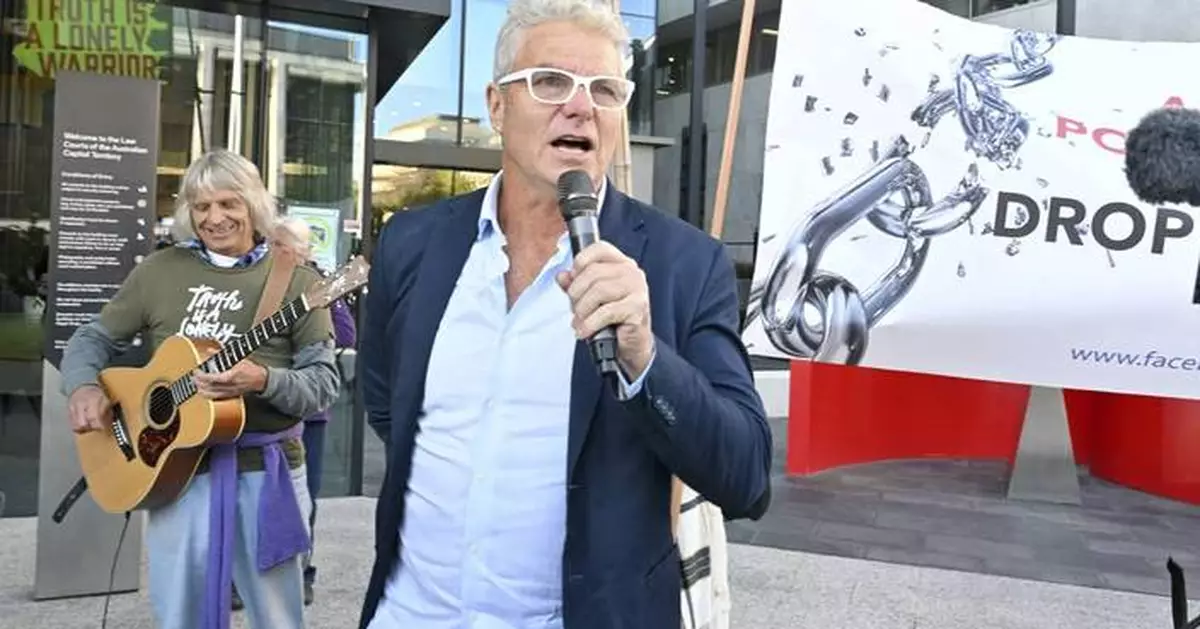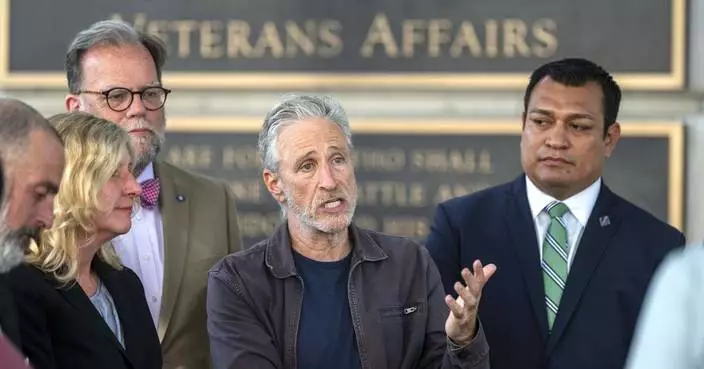MELBOURNE, Australia (AP) — An Australian judge sentenced a former army lawyer to almost six years in prison on Tuesday for leaking to the media classified information that exposed allegations of Australian war crimes in Afghanistan.
David McBride, 60, was sentenced in a court in the capital, Canberra, to five years and eight months in prison after pleading guilty to three charges including theft and sharing with members of the press documents classified as secret. He had faced a potential life sentence.
Justice David Mossop ordered McBride to serve 27 months in prison before he can be considered for release on parole.
Rights advocates argue that McBride's conviction and sentencing before any alleged war criminal he helped expose reflected a lack of whistleblower protections in Australia.
McBride addressed his supporters as he walked his dog to the front door of the Australian Capital Territory Supreme Court to be sentenced.
"I’ve never been so proud to be an Australian as today. I may have broken the law, but I did not break my oath to the people of Australia and the soldiers that keep us safe,” McBride told the cheering crowd.
A lawyer for McBride, Mark Davis, said that his legal team would appeal a ruling that prevented McBride from mounting a defense. Mossop ruled in November last year that McBride had no duty as an army officer beyond following orders.
“We know that the Australian military teach a much broader notion of what the duty of an officer is in a battle field than to follow orders,” Davis said.
Davis said the severity of the sentence also created grounds for appeal, but their effort would focus on the earlier ruling.
McBride’s documents formed the basis of an Australian Broadcasting Corp. seven-part television series in 2017 that contained war crime allegations including Australian Special Air Service Regiment soldiers killing unarmed Afghan men and children in 2013.
Police raided the ABC’s Sydney headquarters in 2019 in search of evidence of a leak, but decided against charging the two reporters responsible for the investigation.
In sentencing, Mossop said he did not accept McBride’s explanation that he thought a court would vindicate him for acting in the public interest.
McBride’s argument that his suspicions that the higher echelons of the Australian Defense Force were engaged in criminal activity obliged him to disclose classified papers “didn’t reflect reality,” Mossop said.
An Australian military report released in 2020 found evidence that Australian troops unlawfully killed 39 Afghan prisoners, farmers and civilians. The report recommended 19 current and former soldiers face criminal investigation.
Police are working with the Office of the Special Investigator, an Australian investigation agency established in 2021, to build cases against elite SAS and Commando Regiments troops who served in Afghanistan between 2005 and 2016.
Former SAS trooper Oliver Schulz last year became the first of these veterans to be charged with a war crime. He is accused of shooting dead a noncombatant man in a wheat field in Uruzgan province in 2012
Also last year, a civil court found Australia’s most decorated living war veteran Ben Roberts-Smith had likely unlawfully killed four Afghans. He has not been criminally charged.
Human Rights Watch’s Australia director Daniela Gavshon said McBride’s sentencing was evidence an Australia’s whistleblowing laws needed exemptions in the public interest.
“It is a stain on Australia’s reputation that some of its soldiers have been accused of war crimes in Afghanistan, and yet the first person convicted in relation to these crimes is a whistleblower not the abusers,” Gavshon said in a statement.
“David McBride’s jail sentence reinforces that whistleblowers are not protected by Australian law. It will create a chilling effect on those taking risks to push for transparency and accountability – cornerstones of democracy,” she added.
Some lawmakers from minor parties and independents raised McBride's sentencing in Parliament on Tuesday.
Greens lawmaker Elizabeth Watson-Brown told Prime Minister Anthony Albanese that McBride had been imprisoned for the “crime of telling the truth about war crimes.”
“Why won’t your government admit that our whistleblower laws are broken and commit to urgent reform to keep whistleblowers like Mr. McBride out of jail?” Watson-Brown asked the prime minister.
Albanese declined to answer, saying it might prejudice McBride's appeal.
“I’m not going to say anything here that interferes with a matter that is quite clearly going to continue to be before the courts,” Albanese told Parliament.
Andrew Wilkie, a former government intelligence analyst whistleblower who’s now an independent lawmaker, said Australian governments “hate whistleblowers.”
“The government wanted to punish David McBride and to send a signal to other insiders to stay on the inside and to stay silent,” Wilkie said.
Wilkie quit his intelligence job in Australia's Office of National Assessments days before Australian troops joined U.S. and British forces in the 2003 Iraq invasion. He publicly argued that Iraq didn’t pose enough of a threat to warrant invasion and that there was no evidence linking Iraq’s government to al-Qaida.

Whistleblower David McBride arrives at the Supreme Court of the Australian Capital Territory in Canberra, Tuesday, May 14, 2024. McBride, 60, was sentenced to five years and eight months in prison after pleading guilty to three charges including theft and sharing with members of the press documents classified as secret.( Mick Tsikas/AAP Image via AP)










